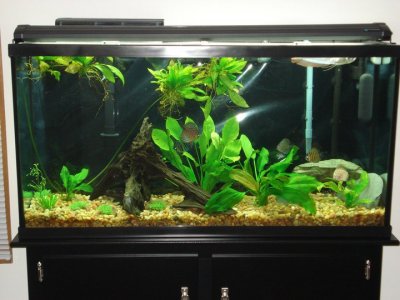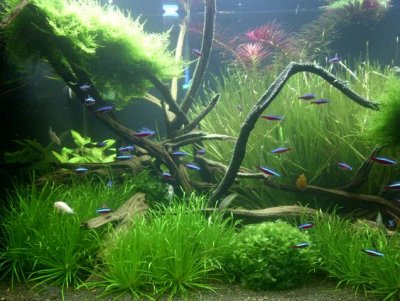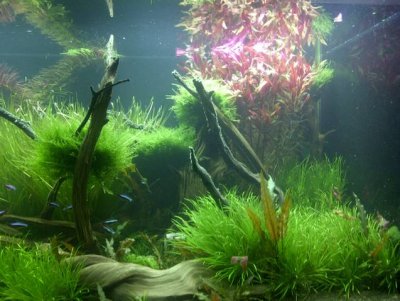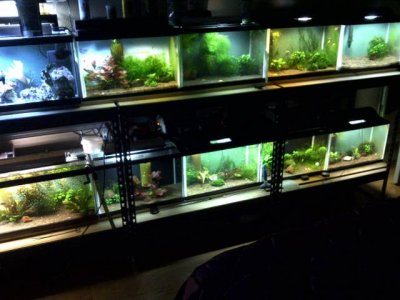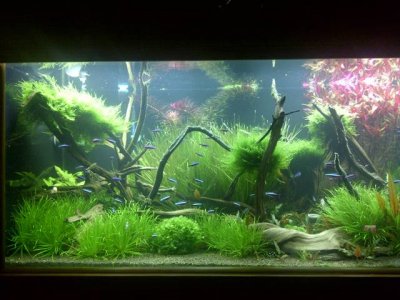It's interesting what you can learn from looking at other reefers and their successes. I've made it a habit to look at many of the unusually successful tanks that I've seen during my fishy travels around the world, and have come up with some unusual commonalities characteristic of many of the great ones. These are observations; however, you might find them interesting, particularly if you are struggling a bit, or having some concerns about your systems.
Observation 1: Many of the most successful reefs harbor a great diversity of life.

Julian Sprung's home reef is a wonderful celebration of marine life.
Interesting, right? Especially because I was just talking about monospecific systems as a different approach just yesterday! Some of the coolest reef tanks I've ever seen feature a complete range of life forms, such as gorgonians, sponges, and a few surprises, not just corals and fishes. When asked why they kept certain animals, the response from most reefers was always the same: “Because I like them!†Not once did any of the reefers mention the words “limited editionâ€, or refer to a “named†coral. These aquarists know what they like, and listen to that “inner voice†when stocking there aquariums.
Their aquariums are lush, and make no apologies for the complex growth of macroalgae and plants interspersed with corals. Just like on a real reef, these systems incorporate life forms that provide beneficial collateral benefits for their inhabitants, such as food, shelter, and nutrient export. These aquariums are beautiful, well-stocked systems that are a visual delight, affording many opportunities to see examples of the endless variety of marine life forms.
Observation 2: The obsession is with the animals, not the numbers.

Dan Rigle is focused on his corals, not his test kits...
The best reefers in the world, IMO, are not those who obsess over values on a test kit, such as pH, calcium, phosphate, etc. Rather, they are comfortable enough observing their corals and other animals to see what is "normal" for them...We've talked about this before, right? Most of these reefers will tell you that they occasionally test their water parameters to establish a "baseline", but they don't go nuts when the nitrate creeps up a tenth of a point, or if the calcium is 385 or 390. What they will freak out about is if one of their animals doesn't look "right." Most of these reefers observe their systems enough to know that something is wrong just by seeing a change in their corals, for example. And, they are usually spot-on.
These successful reefers follow regular maintenance routines, which accomplish specific tasks, such as nutrient export, coral pruning, filter media replacement, etc. However, they do not obsess over hitting specific target numbers They obsess over the health of their animals, and have a good understanding of why something goes wrong with them on those occasions when something does head south. Corrective measures are usually simple.
Observation 3: Green is Good!

"Unconventional" only in that you don't see a lot of marine aquariums like this, right? And why not?
Like me, a lot of great reefers are interested in incorporating macro algae in their systems- a trend you wouldn't expect, right? Seems very "1990's!" Julian Sprung, for example, has a healthy obsession with marine plants (i.e.; seagrasses and mangroves) and macroalgae, and they are crucial in his systems, both from a functional and aesthetic standpoint. It seems to me that most hobbyists, in our frenzy to get rid of algae at all cost from our reef systems, have banished them to the refugium, if we even see them. In Julian’s natural systems, they are front and center. In his systems, you see more macroalgae and plants than you could ever imagine being kept before, and it’s very inspiring. I should mention that his systems have unique substrates, consisting of more nutrient-rich materials than we traditionally use in reef aquariums These substrates obviously have a positive impact on the growth of plants and macroalgae.
I wish that more hobbyists would see the real beauty of algae, such as Dictyota, Halimeda, etc., and embrace them when they make an appearance. Like so many things in nature and in aquariums, they are harmless in small quantities, useful in larger quantities, and invasive in huge quantities, so care must be taken to strike a balance. As long as they do not smother other life forms in the aquarium, your algae can provide aesthetic and functional benefits, such as nutrient export, supplemental food sources, and an attractive alternative to the “traditional†reef aquarium featuring only rock and corals.
Observation 4: Feed often and Well

Your corals will definitely tell you when they're hungry. Listen to them!
Another commonality among successful reefers and their aquariums are that they are well fed. These reefers do not skimp on the food. With many hungry mouths, tentacles, and polyps to feed, their diverse, well-populated aquariums receive a lot of quality food, and in frequent intervals. One of the collateral benefits of creating diverse, complex microcosms is that that the aquarium itself will eventually produce a fair amount of food (ie; microalgae, crustaceans, etc.) for its inhabitants, without any additional intervention on the aquarists' part.
This may be an overlooked benefit to keeping highly diversified systems. Someone is always reproducing, creating feeding opportunities for someone else! Just as in nature! Of course, it would be difficult to meet the gross nutritional needs of an entire closed system with just the foods produced naturally in the aquarium/refugium, but the collateral benefits of some diversity are very tangible.
Observation 5: Practice “Good Housekeepingâ€
With most of the most successful reefers and their systems that I've observed, maintenance consists of respectable water changes and the occasional scraping of the glass to remove microalgae. Most also employ some simple chemical filtration media (such as activated carbon and phosphate removing media) in reactors, to assist with removal of nutrients. The reactors are serviced regularly to keep water quality at optimum levels. Nothing uber high-tech; just simple functional equipment, maintained well.
Routines are important to all reefers, and the best of the best of 'em are very routine-oriented. They do the same things on a regular basis, be it replacing filter socks, conducting water changes, or adding supplements. Nothing is left to chance- it's all about a routine. Maybe not written down, but accomplished regularly. I cannot stress it enough- Many of the most successful reefers I know have developed that innate sense of “listening†to their aquariums. They understand what’s going on in their systems, and can tell if something is not right by simply examining their animals carefully every day.
Observation 6: Take a "Fresh" Approach

Look mom- no salt! At least as addictive as any reef aquarium.
Many marine aquarium hobbyists have a keen interest in all things aquatic. many of them started in freshwater, either with a community tank, or breeding fish. In my opinion, the “cross training†that keeping both freshwater and marine systems affords is both interesting and valuable in developing your hobby skills. Water quality management, system integration, and proper stocking technique are but a few of the lessons to be learned by working with both “mediaâ€.
And it's just plain good old fun. There is a whole freshwater world out there, with clubs, "gurus", concepts, and diversity. It's fun to "cross over."
Lesson 7: Think outside the Box
What I am most impressed by with the best aquariums that I've seen is just how effortlessly they weave together the complex variety of plants and animals. These aquariums are not necessarily replications of specific biotopes, or rigid representations of a specific location on the reef. They don’t follow hobby trends. Rather, they are unique, elegant microcosms of life, assembled in such a way as to benefit all of their inhabitants. Most important, they are stocked with the animals that he loves, and given optimal conditions for life.
There are many ways to accomplish successful, beautiful reef systems. Now and again, it's interesting to sit back and digest your observations on many of the best ones you've seen, to gain some insight. I hope that this brief piece has got you thinking about some of the best reef tanks that you've seen, so that you can benefit from the work of others.
However, although most of these people are happy to share their methods and opinions about reef keeping, don't lose sight of the fact that many of these amazing reefers don't get their inspiration from the "TOTM" on some website. Rather, they are inspired by the natural reef systems, and the diversity of marine life in the oceans. Mother Nature is indeed the best teacher.
By incorporating some of the simple approaches and attitudes outlined here, I think that any marine system could benefit. As the old hobby expression goes, “There is more than one way to run a reef tank.†Thinking outside the box, having a plan, and following your inner voice when designing a system are so important, and add to the joy of marine aquarium keeping.
Until Next Time,
Stay Wet
Scott Fellman
Unique Corals
Observation 1: Many of the most successful reefs harbor a great diversity of life.
Julian Sprung's home reef is a wonderful celebration of marine life.
Interesting, right? Especially because I was just talking about monospecific systems as a different approach just yesterday! Some of the coolest reef tanks I've ever seen feature a complete range of life forms, such as gorgonians, sponges, and a few surprises, not just corals and fishes. When asked why they kept certain animals, the response from most reefers was always the same: “Because I like them!†Not once did any of the reefers mention the words “limited editionâ€, or refer to a “named†coral. These aquarists know what they like, and listen to that “inner voice†when stocking there aquariums.
Their aquariums are lush, and make no apologies for the complex growth of macroalgae and plants interspersed with corals. Just like on a real reef, these systems incorporate life forms that provide beneficial collateral benefits for their inhabitants, such as food, shelter, and nutrient export. These aquariums are beautiful, well-stocked systems that are a visual delight, affording many opportunities to see examples of the endless variety of marine life forms.
Observation 2: The obsession is with the animals, not the numbers.
Dan Rigle is focused on his corals, not his test kits...
The best reefers in the world, IMO, are not those who obsess over values on a test kit, such as pH, calcium, phosphate, etc. Rather, they are comfortable enough observing their corals and other animals to see what is "normal" for them...We've talked about this before, right? Most of these reefers will tell you that they occasionally test their water parameters to establish a "baseline", but they don't go nuts when the nitrate creeps up a tenth of a point, or if the calcium is 385 or 390. What they will freak out about is if one of their animals doesn't look "right." Most of these reefers observe their systems enough to know that something is wrong just by seeing a change in their corals, for example. And, they are usually spot-on.
These successful reefers follow regular maintenance routines, which accomplish specific tasks, such as nutrient export, coral pruning, filter media replacement, etc. However, they do not obsess over hitting specific target numbers They obsess over the health of their animals, and have a good understanding of why something goes wrong with them on those occasions when something does head south. Corrective measures are usually simple.
Observation 3: Green is Good!
"Unconventional" only in that you don't see a lot of marine aquariums like this, right? And why not?
Like me, a lot of great reefers are interested in incorporating macro algae in their systems- a trend you wouldn't expect, right? Seems very "1990's!" Julian Sprung, for example, has a healthy obsession with marine plants (i.e.; seagrasses and mangroves) and macroalgae, and they are crucial in his systems, both from a functional and aesthetic standpoint. It seems to me that most hobbyists, in our frenzy to get rid of algae at all cost from our reef systems, have banished them to the refugium, if we even see them. In Julian’s natural systems, they are front and center. In his systems, you see more macroalgae and plants than you could ever imagine being kept before, and it’s very inspiring. I should mention that his systems have unique substrates, consisting of more nutrient-rich materials than we traditionally use in reef aquariums These substrates obviously have a positive impact on the growth of plants and macroalgae.
I wish that more hobbyists would see the real beauty of algae, such as Dictyota, Halimeda, etc., and embrace them when they make an appearance. Like so many things in nature and in aquariums, they are harmless in small quantities, useful in larger quantities, and invasive in huge quantities, so care must be taken to strike a balance. As long as they do not smother other life forms in the aquarium, your algae can provide aesthetic and functional benefits, such as nutrient export, supplemental food sources, and an attractive alternative to the “traditional†reef aquarium featuring only rock and corals.
Observation 4: Feed often and Well
Your corals will definitely tell you when they're hungry. Listen to them!
Another commonality among successful reefers and their aquariums are that they are well fed. These reefers do not skimp on the food. With many hungry mouths, tentacles, and polyps to feed, their diverse, well-populated aquariums receive a lot of quality food, and in frequent intervals. One of the collateral benefits of creating diverse, complex microcosms is that that the aquarium itself will eventually produce a fair amount of food (ie; microalgae, crustaceans, etc.) for its inhabitants, without any additional intervention on the aquarists' part.
This may be an overlooked benefit to keeping highly diversified systems. Someone is always reproducing, creating feeding opportunities for someone else! Just as in nature! Of course, it would be difficult to meet the gross nutritional needs of an entire closed system with just the foods produced naturally in the aquarium/refugium, but the collateral benefits of some diversity are very tangible.
Observation 5: Practice “Good Housekeepingâ€
With most of the most successful reefers and their systems that I've observed, maintenance consists of respectable water changes and the occasional scraping of the glass to remove microalgae. Most also employ some simple chemical filtration media (such as activated carbon and phosphate removing media) in reactors, to assist with removal of nutrients. The reactors are serviced regularly to keep water quality at optimum levels. Nothing uber high-tech; just simple functional equipment, maintained well.
Routines are important to all reefers, and the best of the best of 'em are very routine-oriented. They do the same things on a regular basis, be it replacing filter socks, conducting water changes, or adding supplements. Nothing is left to chance- it's all about a routine. Maybe not written down, but accomplished regularly. I cannot stress it enough- Many of the most successful reefers I know have developed that innate sense of “listening†to their aquariums. They understand what’s going on in their systems, and can tell if something is not right by simply examining their animals carefully every day.
Observation 6: Take a "Fresh" Approach
Look mom- no salt! At least as addictive as any reef aquarium.
Many marine aquarium hobbyists have a keen interest in all things aquatic. many of them started in freshwater, either with a community tank, or breeding fish. In my opinion, the “cross training†that keeping both freshwater and marine systems affords is both interesting and valuable in developing your hobby skills. Water quality management, system integration, and proper stocking technique are but a few of the lessons to be learned by working with both “mediaâ€.
And it's just plain good old fun. There is a whole freshwater world out there, with clubs, "gurus", concepts, and diversity. It's fun to "cross over."
Lesson 7: Think outside the Box
What I am most impressed by with the best aquariums that I've seen is just how effortlessly they weave together the complex variety of plants and animals. These aquariums are not necessarily replications of specific biotopes, or rigid representations of a specific location on the reef. They don’t follow hobby trends. Rather, they are unique, elegant microcosms of life, assembled in such a way as to benefit all of their inhabitants. Most important, they are stocked with the animals that he loves, and given optimal conditions for life.
There are many ways to accomplish successful, beautiful reef systems. Now and again, it's interesting to sit back and digest your observations on many of the best ones you've seen, to gain some insight. I hope that this brief piece has got you thinking about some of the best reef tanks that you've seen, so that you can benefit from the work of others.
However, although most of these people are happy to share their methods and opinions about reef keeping, don't lose sight of the fact that many of these amazing reefers don't get their inspiration from the "TOTM" on some website. Rather, they are inspired by the natural reef systems, and the diversity of marine life in the oceans. Mother Nature is indeed the best teacher.
By incorporating some of the simple approaches and attitudes outlined here, I think that any marine system could benefit. As the old hobby expression goes, “There is more than one way to run a reef tank.†Thinking outside the box, having a plan, and following your inner voice when designing a system are so important, and add to the joy of marine aquarium keeping.
Until Next Time,
Stay Wet
Scott Fellman
Unique Corals
Last edited:


